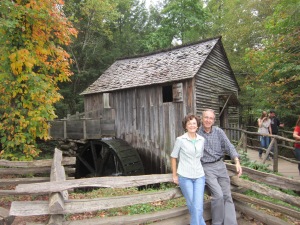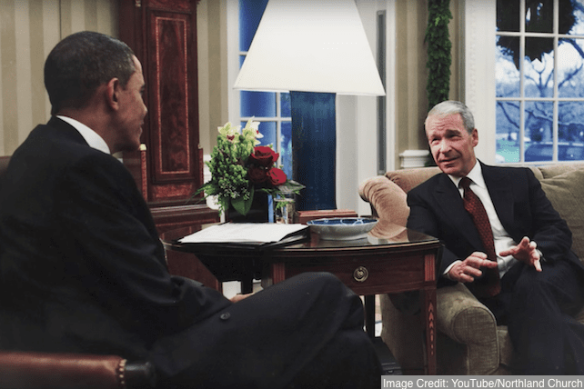 I have interviewed many people over the years, but I don’t think any of those conversations has ever been as timely and important as this one with Pastor Joel Hunter, a theologically conservative Christian who for eight years was a spiritual advisor to the theologically liberal President Barack Obama. Now retired from full time pastoring, the former senior pastor of “Northland, A Church Distributed,” in Central Florida, stays as busy as ever building bridges and coalitions to help people who are in vulnerable communities.
I have interviewed many people over the years, but I don’t think any of those conversations has ever been as timely and important as this one with Pastor Joel Hunter, a theologically conservative Christian who for eight years was a spiritual advisor to the theologically liberal President Barack Obama. Now retired from full time pastoring, the former senior pastor of “Northland, A Church Distributed,” in Central Florida, stays as busy as ever building bridges and coalitions to help people who are in vulnerable communities.
His website, appropriately titled “Imitating Jesus beyond Church Walls,” where he also blogs, bursts with hard-won biblical insight and understanding that he’s learned both as a pastor for nearly five decades and through serving in challenging public contexts, regionally, nationally, and internationally. These are too numerous to detail here, so you really must check out Joel’s website for yourself sometime, especially if you’re meeting him for the first time here.
For some time now, we have been living in a fast-paced and significantly changing world in which inescapable demands have been placed upon us to gain a godly wisdom for such a time as this, and to live by it everyday. The last decade or so has been particularly demanding, socially, economically, and politically. Even our best efforts at public witness in America have often revealed how divided the church had become. The only consensus today seems to be that society at-large says that it is turned off by what public Christian influence there is. Both church and society have come out losers here. And then along comes Covid–19.
In Joel Hunter’s public life and ministry, we find not only a clear understanding but a biblical working out of the demands of Christ’s discipleship on us at a time such as this. He is a respected and important voice in Christian leadership. Of his long and varied callings, we could have talked for hours about a great many things. Instead, we took a hour by phone for a fascinating and insightful conversation about what he learned during eight years as President Obama’s lone conservative spiritual advisor. We then moved from those personal experiences to President Trump’s spiritual advisors. We also talked about Covid–19, as well as about the kind of pastoring that brings healing into congregations that are divided politically, and the importance of crossing boundaries to build relationships. Some of his answers may surprise.
Charles Strohmer: Let’s jump right in, Joel. We first met at a Christian conference in DC when Barack Obama was the President, and you got my attention when you spoke about being a conservative Christian pastor who was also a spiritual advisor to President Obama. What did that responsibility entail during those eight years?
Joel Hunter: Several things. I wrote devotions for him every week out of the Scripture. We prayed together periodically. Really it was a mutually encouraging relationship. I went through some tough times and he called me to make sure I was doing okay. And right after he was out of office, I was making a transition from being a congregational pastor (after almost fifty years) to being a faith community organizer in Florida, and he called me before my last sermon as a congregational pastor and asked, “What are you doing, Joel?” And I said, “I have no idea. I’m going to be a community organizer. What am I doing?” Because that’s what he was before he went into politics. So we’ve had a mutually encouraging relationship, and I have been quite honored to call him a friend.
Charles: When you sent devotionals or prayed with him in person, what kind of approach did you take? Was it personal, or about family matters, or political areas?
Joel: It was all personal. It really wasn’t a political relationship. He did call me a few times before making big announcements. For example, he had just come out for gay marriage, so he called me before that got into the news cycle because he knew that with my conservative Evangelical background I’d be beaten up over our relationship, which I usually was. But almost always our relationship was about personal issues. So when I would pray for him I’d say, “What do we pray about?” By the way, when I would ask him that, he would never ask me to pray for him. He was always asking me to pray for somebody else. He’d said, “I got this letter this week …,” or, “There’s this family that …” It was always about somebody else.
He was also that way in conversation. You could not maintain a conversation about him. He was always more interested in talking about somebody else. That came out of a genuine sense of compassion and humility and the understanding that I’m here to offer others some good. So let’s go to the Lord about that.
Charles: How were you as a theological conservative able to square being a spiritual advisor to a theologically liberal President? It must have been a struggle.
Joel: Yes, we came down on various sides of issues. But when you love and appreciate somebody, you give them the space they need and you trust God to take care of all that. I’ve never needed someone to agree with me in order to love them fully. I would have a very narrow band of relationships if I demanded theological agreement before I loved people. And that’s the way Jesus was. Jesus crossed all kinds of boundaries in order to love people who were not like him. So it sounds difficult, but it was really very easy. When you see somebody as a person who you know is trying to do others good, and you know that even if you disagree on the interpretation of Scripture, that both of you have a keen appreciation for Scripture, then the rest, well, you’ve just kind of got to let go.
Charles: How did you get that gig?
Joel: Early in 2008, I was featured in a New York Times article on racism. A few weeks later, Joshua Dubois, Senator Obama’s religious outreach person, called me and said that Senator Obama would like to have a conversation with me. So I said, “Great,” and about a week later Senator Obama and I talked for about thirty minutes on the phone. His basic question was, “How can the government and faith communities work together without violating the commission of each?” And I said, “Senator, probably the most unused resource for community healing and well being in this country are faith communities. We have the highest percentage of volunteers and we just want to make things 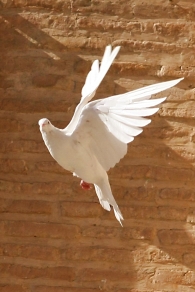 better.”
better.”
I was then asked to be on a couple panels that asked the presidential candidates, during the campaign, questions, in forums. So I had opportunities to ask questions to people like Hillary Clinton. After I had asked her a question during the second forum, I felt someone behind me tugging on my coat and saying, “Hey, would you come back and pray with Senator Obama before he speaks?” I said, “Sure,” and so I followed this guy down through the catacombs of the building, thinking I’m going to be one of fifty pastors surrounding him. But when I got there it was just me and him in the hallway. And that week the press had just beat him up something terrible. So I said something like, “Senator, you’ve had a rough week.” And he looked at me and said, which was typical of him, “No. The single mom trying to put food on the table had a rough week. I’m fine.” So I prayed with him before he went on, and after that we had a deep relationship.”
Charles: Did he have other kinds of spiritual advisors in his circle?
Joel: There’s an article in the March 15, 2009 New York Times that talks about five of us. I was the only white Evangelical pastor. But there were others in his circle of prayerful encouragement. A couple of times T. D. Jakes and I were with him together in the Oval Office. And sometimes, like on his birthday or special occasions, he would get on the phone with several of us, including people like Joseph Lowery and other great old African-American preachers.
Charles: Was it beneficial for him to have a circle of spiritual advisors who were different theologically?
Joel: Absolutely. He thrives on various perspectives. He’s incredibly smart. I can’t tell you the level of his intellect. So it’s easy for him to take in various perspectives and come up with his amalgamation of what’s just been said and go with that.
Charles: Since Donald Trump’s election, there’s been an avalanche of stories in the media and the press about his conservative and charismatic spiritual advisors. Do you know if he has other kinds of religious advisors in his Presidential circle?
Joel: No. I know many in that group. They are all of the same theological perspective. This President really puts a premium on loyalty and on agreement, so that’s his circle.
Charles: President Trump has quite a different method than, say, President Lincoln. I mean, in her excellent book Team of Rivals, Doris Kearns Goodwin writes extensively about how Lincoln surrounded himself with advisors, including on his cabinet, who were different from him, including even some political enemies. But that method really paid dividends when it came to gaining the kind of wisdom needed back then to keep the union together, even through a civil war.
Joel: Yes. And that’s how President Obama was first elected. He had that team of rivals, a broad field of political friends and advisors. But the machinery of government always takes over. As the time went on, especially in his second term, it did become more consolidated into fewer voices and political agendas in order to get things done.
My mama used to tell me that I would never learn very much from people who think exactly like I do. You learn from people who have a different perspective or a different truth. So I acquaint differences with flourishing, or being enriched.
Charles: How did you process, internally, deal with, struggles you had, being a conservative Christian pastor, with some political decisions President Obama made that you clearly opposed?
Joel: Well, one time I was out driving with my wife, Becky, and I get this call, “The President would like to speak with you.” So I pulled off into a parking lot because I didn’t want to be talking to the President while I’m driving along. So he comes on the phone and says, “Joel, I just want to tell you about a decision I’ve just made. I’ve just had an interview (I think he said it was with ABC) to say that I’ve come out for gay marriage.” And my first response was, “Mr. President, I don’t see that in Scripture.” And his response was, “I know you don’t. But listen to how I arrived at that.” Then he talked about the difference between civil law, which is for all of the citizens, and moral or religious law, which is for the adherence of believers in that particular realm.
As I understood President Obama, you stick this guy and compassion comes out. If somebody’s being left out, it’s almost more than he can take. He made his decision on the basis of what he conceived as fairness, and compassion, and people being hurt unnecessarily as it translated into a law for all citizens. I understood that. When I was interviewed afterward and asked about it, I said, No, that’s not my definition of marriage. When I spoke about it to my congregation, I said you’ve got to be discerning between what’s fair for everybody and what’s right for those us who interpret Scripture in a certain way and our lives that way.
Charles: Over the years, I noticed that there’s a lack of understanding in some Christian circles about the difference between the purpose and function of civil law in American polity and that of moral or religious law. For one thing, I’m convinced that if you try to force a moral law on a people who don’t see the point of obeying it, you’re going to foster rebellion.
Joel: That’s right. Our natural human bent is to try to gain as much power for our POV as we can. Many Christians use politics for that. But there’s not a full trust of God in that process. We need to note this when we’re making decisions, as to why we are making decisions. Are we making them to keep in control and impose our views, or are we making them because we just want to do what we believe is right and then let the circumstances take care of themselves.
Charles: So President Obama didn’t track with your view on gay marriage, but do you know if over those eight years your prayers or wisdom for him influenced him policy-wise or personally or with his family?
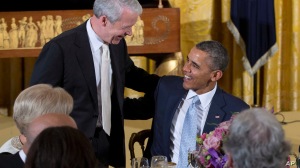
President Barack Obama greets Dr. Joel C. Hunter, senior pastor of Northland, A Church Distributed, in Longwood, Fla., during the Easter Prayer Breakfast, Monday, April 14, 2014, in the East Room of the White House in Washington. (AP Photo/Carolyn Kaster)
Joel: I think I know several ways that he took my perspective into consideration when he was making decisions. But I’m really not at liberty to talk about that. I can say that he invited my family to the Oval Office and told them that I had a profound impact I’d had on his life and presidency. He was very kind to say that.
Charles: If you got a call from President Trump’s Chief of Staff to ask you if you’d be his spiritual advisor, would you jump at the chance or would you beg off?
Joel: It’s the President, you know. Scripture tells us to pray for those in authority. I don’t think I’d last very long! But I would do everything I could to give my interpretation of Scripture as to what the subject was and be as supportive as I could while I was doing it.
Charles: Some years ago I participated in conference call with a number of religious and political leaders. We were talking about “learning wisdom from the other.” Which is a biblical idea. Tim Keller was part of that conference call, and when I asked him for his thoughts on this, he immediately located that kind of learning in the Bible’s teaching on common grace. I want to quote for you part of what he said and get your thoughts on it. All human beings, he said, “whether they believe in God or not, share gifts of wisdom, insight, creativity, and beauty because these gifts come to everyone. Christians call this common grace, because they consider these as gifts that come from God. If that’s the case,” he concluded, “then I could expect that my neighbor who does not believe anything like I believe might still have wisdom from God that I have to listen to.” You seem to me to have that kind of heart.
Joel: It’s how I’m wired. My mama used to tell me that I would never learn very much from people who think exactly like I do. You learn from people who have a different perspective or a different truth. So I acquaint differences with flourishing, or being enriched. I’m sure Tim, he’s a friend, must have had this in mind, that our full worship of God depends upon our full pursuit of truth wherever it is. “All truth is God’s truth,” as the saying goes. And as Kepler said, “I think God’s thoughts after him.” It’s so important for us, no matter where truth is coming from, whether from the realm of science, or philosophy, or even from other religions that have a sense of how God has created the world. I’m thirsty for it all. And I bring it all to Christ, because, as it says in Colossians, Jesus is before all things, and in Christ all things hold together. So I am always trying to learn all I can because I believe it will bring me closer to Christ.
Charles: Do you find people have sticking points when it comes to crossing boundaries to build relationships?
Joel: Yes. Our biggest enemy is inertia. We want to do what we’ve always done, and change costs. And that cost we can see. What we can’t see is the cost of not changing. And that’s a tsunami. It’s trying to say, Hey it’s worth changing to be more like Jesus. It’ll be more inconvenient and more uncomfortable, but boy will life be better.
People are driven toward ideology instead of to the harder work of relationship. Ideology has its appeal because it’s so simplistic, and it makes you feel self-righteous, and it gives you a sense of belonging that’s automatic but not real.
Charles: What can we do to break out of listening only to our own peer groups so that we can cross boundaries, be less self-focusing and more relationally open to people who aren’t like us?
Joel: What won’t work is argument and shaming. That works for maybe about a day. I had a professor who used to talk about how difficult change is. “It’s like pushing mush with a stick,” he would say. “The little part you’re pushing moves but the rest of it just stays the same.” But what does work is the general appeal, especially to believers, of what is right and what they could do that they could do fairly easily.
For example, years ago Becky and I created an initiative called Simple Help. You do one thing a day that takes less than five minutes and costs less than five dollars. There are thousands of us that are doing it, and incrementally the world gets better. When you do this it builds in you a mentality that says: I am making a difference. Most people think: I can’t make a difference. But if you don’t think “solve the world’s problems,” but you do think “I can open a door for someone,” or, “I can share with someone how I got through what they are going through, “ those little things make a huge difference. You just have to make the help concrete and accessible enough that people can act on it, and not feel like they’ve got to solve everybody’s problems all at once.
Charles: One ever-present stumbling block to learning wisdom this way can be social media, where a Manichean worldview is increasingly present, in which the world is said to be divided into two enemy camps that are eternally at war with each other. Christians are falling prey to this, too. It’s tragic. It’s further dividing the body of Christ. Using some of the principles you’re learned and applied over the years, how can we start to change that dynamic on social media, or is it hopeless?
Joel: Well, one thing is that I don’t do social media very much. I don’t have a Facebook account and don’t spent spend much time online trying to discuss issues. I’m on Twitter and Instagram, but mostly just to keep up with my friends. But what you’re pointing to is not just characteristic of social media. The whole country right now is becoming more and more polarized and politicized. There seems to be a choice, almost an ultimatum, that you’re either going to be a bridge builder or a wall builder.
You can have an approach that is Christ against the world, very adversarial, battle of light and darkness, which is not Christianity. So some Christians see this as a pitch battle between good and evil and we’re on the good side and everyone who doesn’t agree with us is on the bad side. To me, that is not at all resembling the life of Jesus.
Jesus had this philosophy and approach to life that all the world was God’s, and that even those who didn’t know him, those deemed unacceptable, need to be served and respected and reached out to with the love of God. It’s not about what’s in them. It’s about what’s in us. So I can’t help but hope that the voices that continue to make friends instead of create enemies will in the end gain more ground. But it is going to be a difficult slog with our present adversarial approach. .
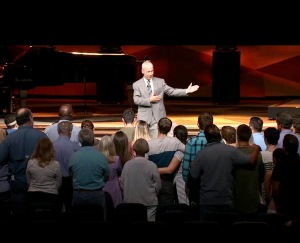 Charles: All across America you can find all kinds of congregations filled with all kinds of people. They are ultimately united in Christ through the fellowship of the Spirit, but they still may have different if not conflicting social, economic, or political views within the same congregation, especially during the Trump Presidency, the difficult CV-19 period, and increased racial tensions and activism. You’re a pastor. How can pastors and ministers who are shepherding politically diverse congregations speak to these issues in their sermons, Sunday schools, Zoom groups?
Charles: All across America you can find all kinds of congregations filled with all kinds of people. They are ultimately united in Christ through the fellowship of the Spirit, but they still may have different if not conflicting social, economic, or political views within the same congregation, especially during the Trump Presidency, the difficult CV-19 period, and increased racial tensions and activism. You’re a pastor. How can pastors and ministers who are shepherding politically diverse congregations speak to these issues in their sermons, Sunday schools, Zoom groups?
Joel: First of all, put everything is a scriptural context, not a political or cultural one, because pastors need to be representatives of the healing and enlightening truths of Scripture. So whatever we’re talking about, we need to find the place in Scripture where this is a principle. It’s also very important that God made us for relationships. He himself is a relationship. When the Bible says that God created male and female, he created “them” in his own image [Genesis 1:27]. The word there for God is “Elohim,” which is a plural word used in a singular sense. In other words, God is a relationship. So if we’re made in the image of God we’re made for relationships.
How this applies to Covid-19 and also to the political divide in our congregations is that you won’t get very far in maturing your congregation by arguing issues or by trying to come down from the mountain with the answer. You will only get as far as you will build actual relationships with those in the congregation and empower or equip them to build relationships with those outside the congregation. Now, that doesn’t depend on a bunch of people assembling in a building. What it depends on is loving your neighbor as you love yourself.
So the answer is right there, dead center in Scripture, but we’ve become so accustomed to the paradigm of western Christendom; that is, we all gather inside a building, we listen for a while, and then we go back to our regular lives. That’s a very shallow version of Christianity. And that’s going to get wracked by both pandemic results and by the coming culture of a younger generation that has no appetite for institutional religion. So we’d better figure out how to build meaningful relationships that makes the world better. That’s what the first century church was. It was built on relationship, and the world came to Christ because those relationships were making the world better.
Charles: I’m thinking of Jesus’ heartfelt felt prayer for his followers in John 17, just hours before his death. Today we Christians seem so far away from anything even close to that kind of unity in diversity that Jesus wants of us through the fellowship of the Spirit. Instead, we seem increasingly divided by our rigidly held, conflicting ideological positions. That won’t hold the church together.
Joel: No, it won’t. People are driven toward ideology instead of to the harder work of relationship. Ideology has its appeal because it’s so simplistic, and it makes you feel self-righteous, and it gives you a sense of belonging that’s automatic but not real. The harder work of relationship is full of frustrations and ambivalence and “I don’t know if I’m doing any good here or not.” But it’s the only real work there is. Ideology is not a real-world comfort or strength. It’s just siding up with an idea, and getting mad that everyone isn’t going along with you.
Charles: To focus specifically on the rising division over race in our country, what are some creative strategies for helping white pastoral leadership who are resistant to, or even hostile to, discussions about racism in the current divisive crisis? Often the critical source for their hostilities comes from political perspectives.
Joel: One of the keys that Jesus talked about was that before you see the problem with your brother, notice the problem in yourself; before you would take the speck out of your neighbor’s eye, look at the log in your own. Self-examination is key to spiritual maturity. If white pastors will educate themselves, be brave enough to note the structures of privilege that they have because they’re white – the almost invisible systems of racism in which they were raised, designed for white people to keep power.
Part of the resistance is that automatically when we talk about racism people get defensive because they feel like they’re being accused of something that they didn’t intend. But this is not about accusation. It’s about education and self-evaluation. I think of the Psalm that says “create in me a clean heart, O God,” and the Scripture that says if a person says he has no sin, the truth is not in him. All of these call for the question that the disciples asked Jesus the night before he died: Is it me, Lord? Am I the one?
If we can encourage one another to ask that question, if we can say to ourselves and to each other that all of us have some complicity in the present problem – all of us have ways in which we could improve and walk closer to Christ – then we could say: Well, I guess they’re not trying to blame me. I guess they’re just trying to say that there’s something I need to discover that will make the situation better. I think that’s how to approach it.
Charles: Tell us a little about what you’ve been doing, publicly, since retiring a few years ago from pastoring full time. I know you like to regularly convene all sorts of people for regional conversations, with your Community Resource Network.
Joel: I went into the pastorate out of the civil rights movement, so I have always had in my heart a special place for people who were being left out. It’s important to me to spend my remaining days, and I hope they are many, to circle back a place where I can build bridges and coalitions to help people who are in vulnerable communities. So I’ve been trying to do less nationally and internationally and do more in my own region in central Florida. So I was chairman of the Central Florida Commission on Homelessness, and right now I’m doing racial reconciliation with a lot of groups in our area. The more you can do in your own region, where you have the most influence, the more sustainable it’s going to be. So I’m working with a lot of people who have been left out and seeking biblical justice that is restorative and relationally reconciliatory. We have this ministry of reconciliation.
Charles: We’ve been talking about a pretty challenging kind of discipleship. It can be rough at times, learning from people who are not like us, building new relationships. But it’s a discipleship journey in which we get to know Jesus a little better all the time, understand more of his interests across the spectrum of life. So we need to see what Jesus is doing and partner with him for God’s glory and human flourishing. Your closing thoughts for us?
Joel: Well, the older you get and the more you know, the more you realize how much you don’t know. But my grandmother used to say, “Leave a place better than you found it.” And Jeremiah 29:7 talks about seeking the well being, the flourishing, of the city, because in its well being will be your well being. So I would just ask people to be involved in doing whatever good they can for whoever they can, especially those who have been left out. And their lives will be filled with more satisfaction and more peace than they have anticipated.
Charles: Thanks very much for taking time for this conversation, Joel. Much appreciated.
Joel: Glad to help. Thanks for what you’re doing.
©2020 by Charles Strohmer
Images of Joel Hunter courtesy of Community Resource Network. Dove and Children images courtesy of Creative Commons.





